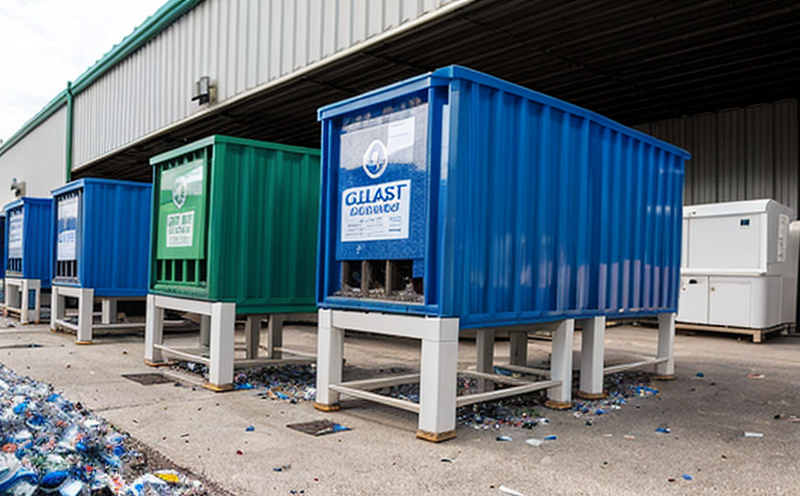ISO 12816 Lead Content in Recycled Glass Products
The ISO 12816 standard is a critical tool for ensuring recycled glass products meet stringent quality and safety requirements. This service focuses on the lead content testing of recycled glass, which is essential to prevent contamination that could pose health risks.
Lead contamination in recycled glass can arise from various sources such as old leaded windows, stained glass, or even some types of ceramics. Ensuring compliance with ISO 12816 is crucial for manufacturers, especially those targeting markets where consumer safety and product integrity are paramount.
The testing process involves several steps that must be meticulously followed to ensure accurate results. Specimen preparation includes breaking down the glass into smaller pieces, which are then homogenized to obtain a representative sample. This step is critical as it ensures the accuracy of subsequent tests by providing an unbiased sample for analysis.
Instrumentation plays a crucial role in this testing process. The primary tool used is an atomic absorption spectrophotometer (AAS), which measures the concentration of lead. This instrument provides precise and reliable results, making it indispensable for compliance testing.
The acceptance criteria according to ISO 12816 are stringent, ensuring that products do not exceed a specified limit of lead content. Any product exceeding these limits is deemed non-compliant and must be reprocessed or discarded. This standard helps maintain the integrity and safety of recycled glass products in consumer markets.
The importance of this service extends beyond compliance; it also supports sustainability efforts by ensuring that recycled materials are safe for use. Compliance with ISO 12816 not only protects public health but also builds trust among consumers, who increasingly seek environmentally friendly and safe products.
Our laboratory adheres strictly to the requirements of ISO 12816, ensuring accurate testing and reliable data. This commitment is reflected in our rigorous quality control measures, which include regular calibration of instruments and adherence to standardized procedures.
The implications of non-compliance with this standard are significant. Products found to exceed lead content limits can face rejection by buyers or even be recalled from the market. This not only incurs financial losses but also tarnishes a company's reputation, potentially leading to long-term damage.
Our expertise in this area allows us to provide comprehensive support to our clients, offering guidance on best practices for specimen preparation and instrumentation calibration. We offer tailored solutions that help companies stay ahead of regulatory changes and market demands.
Industry Applications
| Application Area | Description |
|---|---|
| Recycled Glass Manufacturing | Ensure compliance with lead content limits, enhancing product safety and consumer trust. |
| Ceramic Recycling | Avoid contamination that could affect the final product's quality and safety. |
| Environmental Compliance | Maintain environmental standards by adhering to international guidelines on recycled materials. |
| R&D for New Products | Develop products that meet stringent safety and quality standards, ensuring market readiness. |
| Sustainable Packaging Solutions | Create packaging materials that are both safe and environmentally friendly. |
| Consumer Goods Manufacturing | Ensure compliance with international standards, safeguarding public health. |
Eurolab Advantages
Our laboratory offers several advantages when it comes to ISO 12816 lead content testing for recycled glass products. Our state-of-the-art facilities and experienced team ensure accurate, reliable, and timely results.
We provide a comprehensive service that includes not only the testing itself but also expert advice on specimen preparation and instrumentation calibration. This holistic approach helps our clients stay compliant with international standards and market demands.
Our commitment to quality is reflected in our rigorous quality control measures, which include regular instrument calibration and adherence to standardized procedures. We invest heavily in training our staff to ensure they are up-to-date with the latest testing techniques and best practices.
The reliability of our results is further enhanced by our use of internationally recognized standards such as ISO 12816. This ensures that our clients can trust the data we provide, which is crucial for making informed decisions about their products.
We also offer a range of additional services to support our clients' compliance efforts. These include tailored training sessions and regular updates on changes in international standards. Our goal is to help our clients stay ahead of regulatory changes and market demands.
Customer Impact and Satisfaction
The impact of ISO 12816 lead content testing on our customers is significant. By ensuring compliance with this standard, we help manufacturers maintain the safety and quality of their products, thereby enhancing consumer trust.
This service also supports sustainable packaging solutions by ensuring that recycled materials are safe for use in consumer goods manufacturing. The reliability of our results helps companies avoid costly recalls and reputational damage.
Our customers benefit from our expertise in specimen preparation and instrumentation calibration, which ensures accurate and reliable testing. This not only enhances compliance but also supports innovation in product development.
We are committed to providing excellent customer service, ensuring that we meet the needs of quality managers, compliance officers, R&D engineers, and procurement teams. Our goal is to help our clients stay ahead of regulatory changes and market demands.





